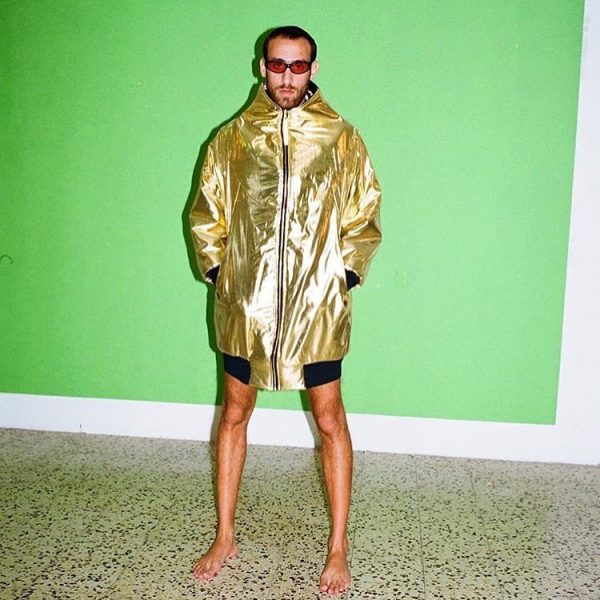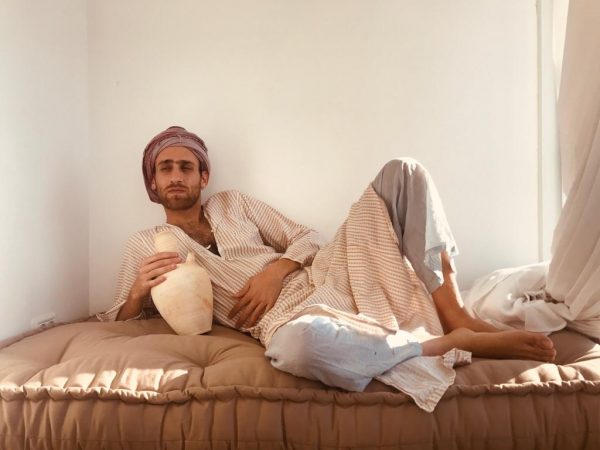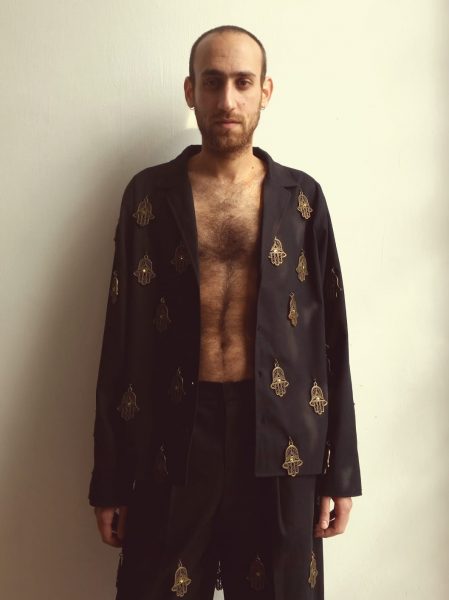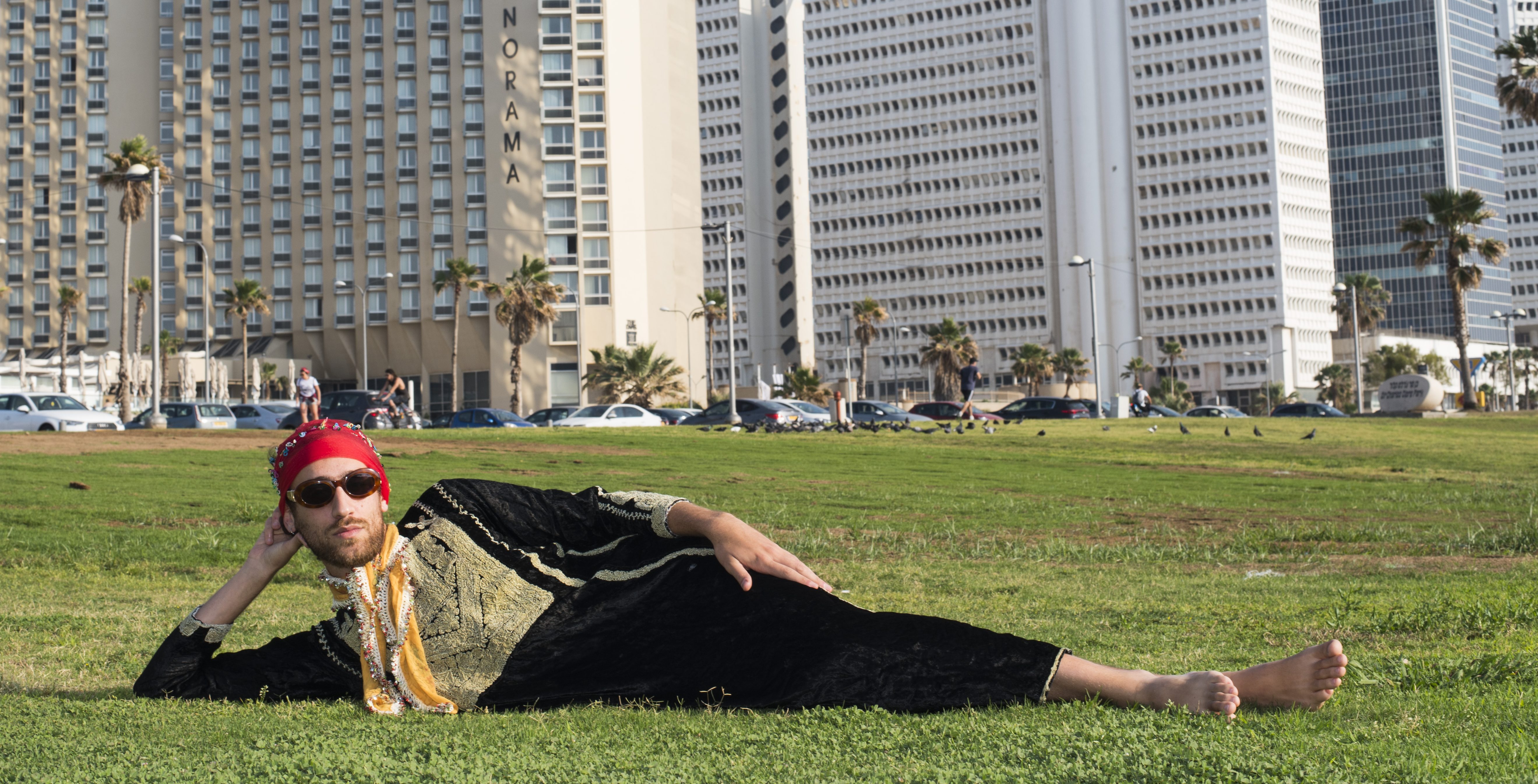*Photo by Dor Schwartz
Sami Zibak is a queer Palestinian DJ that emerged out of Tel Aviv’s club circuit, and has gone to help establish a new clubbing community in Haifa as well as regularly playing abroad in places like Berlin and soon Oslo. Sami Zibak’s personal history is colourful mosaic of influences that straddles a rich cultural heritage that goes from his Palestenian roots to the queer clubbing community that embraced him as a dancer and DJ.
Stepping into the queer clubbing community in Tel Aviv, Sami Zibak went from being a guest to a dancer, providing the alluring visual component to the music. Dancing opened the door to DJing, and Sami soon captivated his audiences in sound, in much the same way his dancing did before in movement. As one of the first openly queer Palestenian DJs, he not only paved a way forward for others, but opened the door to entire community waiting in the wings.
From Tel Aviv he moved to Haifa, considered to be the beating heart of the Palestinian underground scene, leading a gateway to the surrounding Arab communities in the region including Golan Heights, Ramallah and Amman (Jordan). Sami Zibak is an elusive force on DJ circuit in the region with sets informed by the same eclecticism that follows his cultural roots.
There is very little left unexplored through his sets, as he favours an openness that reflects the person behind the set. From Deep House to 90’s rave breakbeat, Sami’s sets can go everywhere in his unflinching pursuit in finding some fluidity between his audience and the music he plays. Being openly queer and Palestenian, comes with its own complexities that seem unlikely to merely unravel through a set. So with a visit to Oslo for Everysome and Jaeger looming, we reached out to Sami via email to ask more about some of these complexities and how they inform his work as a DJ.
Hello Sami and thank you for taking the time to talk to us.
Hey! Thank you very much for this interview!
I understand that you are a queer Palestinian living and working in Israel. Can you give us a little more background information about how you arrived in Tel-Aviv?
So, many people don’t know, but after Israel declared itself as a country in 1948, Palestinians were divided into 3 separate domains, Gaza Strip, The West Bank, and some of us stayed inside what became Israel. My family is from Nazareth which is an Arab city in northern Israel that is well known in the christian faith, and Nazarene Palestinians didn’t leave their homes (as many other Palestinians did back in 1948). So I am from the Palestinians that lives inside Israel and I have an Israeli passport.
To make a long story short on how I got to Tel Aviv, it all started with my parents Azmi and Ghada, that left Nazareth after finishing high school and moved to Haifa city to study Arts and Engineering in the university. After graduating, they moved to Tel-Aviv and was part of the first Palestinians to live in this city back in the 80’s. They wanted to live a less conservative life and experience more cultural options. Tel Aviv is a city mainly inhabited by Jewish-Israelis and its considered to be the jewel of Israel, which means the government puts a lot of money and effort to make it look shiny, bright and colorful, which in many ways it IS, but in some other ways it is not, when you realise it’s a bourgeoisie bubble that likes to perceive itself as open and elevated when in real life it’s a greenhouse for ignorant rich people that practice left wing ideas as if they were a pilates or yoga classes… in other words, their elevation reaches only to the edges of their comfort zone and no further.
Anyway, I was born in Jaffa, which is an Arab city connected to Tel-Aviv. My parents moved here when me and my older sister, Haya, were born so we could grow in an Arabic speaking environment and practice our Arab and Palestinian culture. I will explain shortly that in the middle east, there are Arabs with different religions, there are muslim, druzi, and christians. My family is christian (not religious), but regardless of our so called faith, we share the same cultural system as any other Arabs.
I grew up in Jaffa, I loved my childhood. At some point in the beginning of my high school days I became very socially popular in the Arab community in Jaffa for my work in the scouts, church and other local institutions. But when I came out as gay at age 17.5, I was totally banned from this community, and in one day, all the connections I had, came to an end. As a result I moved to Tel Aviv, to search for a place and people that will accept me as I am and will grant me the environment to practice and discover my unique self.
How did you get into club music from there?

I’m a super social person, therefore I make friends quickly. And so was my first footsteps in the city; I was very excited and thirsty to discover new communities and people, and the Tel-Avivians were extremely curious to know who is this new gay Arab that arrived in their city, because back then (2007) I was almost the only Arab in the hip community of Tel Aviv. So in the very beginning before I knew anybody I went to a gay party called PAG – I was under age to go into the club, 17.5 years old, and the bouncer allowed me to go in because I was cute, or because it was my destiny to go in. Entering this party which was my first club experience ever, I was shocked from everything I saw, starting from the electronic music (back then it was the Electro genre) and from the cute guys and from the crazy performers and dancers, fashion, which was all about neon new wave. It was a whole new world for me and I loved it because I have never seen such a thing before. I fell in love with this music and vibe, and shortly after I started to work at the door of this party and went in a dress to my shift.
I was super bitchy with the guests, so the owner of the party, Roy Raz told me to go inside the club and dance. A little while after I became the ultimate all time diva of this party and my voguing dance performances are well remembered and admired till today in many parts of Tel Aviv. Many other new queer personalities in the city, both Arabs and Jews came in search of me and were inspired and encouraged to be their beautiful self. One thing I can tell you is that I couldn’t do it without the music that was played in the club. A mix of electro and oldskool house trax with piano keys, put my soul on fire and my body couldn’t resist making the most amazing poses and postures on stage (the stage was a speaker). The funny thing is that when I was performing on stage, I always had an inner conflict whether to continue dancing or to go down the stage and run to the dj booth to ask him for the track id.
Yes, I believe it was dancing that provided the impetus to start DJing. What was it about DJing that appealed to you and what music tended to spur you on?
As a dancer I developed a close relationship to the resident dj of the party, those days it was Partok, nowadays he’s a resident dj at The Block club in Tel Aviv, lives in Berlin and plays regularly at Berghain. I was really into his music, and he knew my appreciation was genuine because my musical background was totally different and what I was hearing at the club was completely new to my ear. One day he opened a small bar in Tel-Aviv called Laika Bar and he offered me the opportunity to throw a party there and be the dj. It was kind of a funny thing that we did for the gimmick, but he really taught me to dj on actual CDS. Back then the music I loved was American east coast new wave of deep house, mainly originating from the Underground Quality label of Dj Jus Ed, and its superstars back then: Fred P, Levon Vincent, Dj Qu, Jenifa Mayanja, Anton Zap (Russia), and I was also very into the minimal sound of Hamburg that was led by Dial Records and Smallville records.
Did you have any musical background before this?
I played the violin through childhood, and then the saxophone throughout early high school but I had to stop because of surgery on my lungs. But that was okay because exactly then, a bit after the millennium, the internet became more usable and the likes of wikipedia became available. I remember surfing the web for hours moving from one topic to another through the modern history of rock music supported by lots of psychedelic, progressive rock and experimental music records my parents collected in the 70’s and 80’s. I have always been drawn to music that has an evolutionary background to it. That’s why when I play a track I know what the producer stands for when he released it.
You moved to Haifa at some point. What was the motivation for the move and how do those two scenes differ from each other?
After many years in Tel Aviv between 2007 till 2013, I didn’t practice my Arabian culture, and I barely spoke my mother tongue. I was waiting for life to open a door to Arabs that will accept me as I am, and that I could be who I really am in their midst, with all my freedom and colorful personality and mind. And this door opened in 2013 at one of the “Acid Crew” parties I was doing with my crew back then in Tel Aviv.
I was dancing in the middle of the crowd when suddenly I heard people speaking in Arabic, and I turned and looked at them and fell in love. It was as if I found home again. I could speak Arabic in the midst of my Tel-Avivian parallel-reality that I created for myself. That was insane, and after the party ended, I couldn’t think about anything else other than these beautiful people I met there. The weeks after, I started to go regularly to Haifa to dj at their parties. Till the day I decided to move there and make the best out of this opportunity.
For all of us, both me and the Haifa underground scene which was in its very first steps, our encounter was both exciting and weird. For me I was totally shocked that I’ve found Arabs that liked to party hard like me, and they are all about freedom and self expression and resistance to the oppressing norms. And for them it was shocking to have a new member of their community to be extremely open about my gender fluidity and my sexual orientation.
Plus our music was so different. I was playing strictly house music both oldskool and deep house, and they were kinda still into Trance music. Slowly they opened up to techno and underground house music after travelling in Europe and visiting clubs in Berlin etc.
Another difference between my experience in Tel Aviv and Haifa, was that the Tel Avivian scene which is a totally Jewish-Israeli scene based upon comfort. Although they sometimes have problems with the police and stuff, in general they are comfortable because they are in their own country and they are free to express them-selves as they like.
However, the Haifa scene is completely different, because its a scene that was forged as an encounter riot to the racism its members faced in their attempts to participate in the Israeli nightlife and cultural scene. Many times they were rejected at clubs, and not given chances to play in Israeli clubs. So the scene itself is more about resistance and riot against the opression, and into creating a safe space for Palestinian artists and ravers both from the west bank and Israel to come and enjoy themselves and be creative together.
Were there ever any prejudices or obstructions that you faced stepping into the booth as a queer Palestinian?
In Tel Aviv, I always knew how to transform what could be an obstacle to an advantage. For example, in Tel Aviv which is a city ruled by Jewish-Israeli people that for many years didn’t give almost any Arab Palestinian dj/party promoter/performer a stage, I could break through this wall and claim my stage, when I know that many other Palestinians couldnt do the same.
In Haifa, one of the main obstacles was and still is, is the fact that I have such a strong and rare connection to Tel Aviv, which some Palestinian people consider as treachery. So many times I find myself looked at in a suspicious manner by my fellow Palestinians in the Haifa/Ramallah scenes.
And last but not least, in Ramallah (West Bank), I have many ravers there that love what I have to offer as a dj but some of them again have a problem with my connection to Tel Aviv. Also there was that time I played in Ramallah and almost got arrested by Palestinian authority for going into the toilet with a guy. Haha. thank the goddess I had the urge to run.

From what I’ve heard (mostly online), your sets are quite diverse, and you go from Disco to nineties breakbeat. But what do you usually look for in music to make it into your sets?
I always look for mind & heart uplift and elevation through sonic frequencies and words, adding to it the colorful freedom my queer state of being gives me, and there you have a diverse, colorful, uplifting, cool set.
Also the background of the music is super important to me. Music that is strictly made to express a need for change will always have my favor because when I play it in a club I support them and educate my crowd.
We’ve had a few DJs from the region play in Oslo recently, and for the most part it’s very similar to what we hear around clubs in Europe. Are there ever any regional (especially Palenstenian) elements that you like to convey in your sets?
I don’t combine Arabian/Palestinian motives into my sets. I play only what I love in the genre of club music. I am aware of the international demand from Arab djs to come and play electronic music combined with Arabian elements. But I am against this oriental obligation. I don’t have to play Arabic stuff just because I’m Arab. I will play whatever I like. But I know that many other Arab djs fall into this demand and play oriental sounds for the white crowd that is thirsty for a taste of exotic rhythms.
Do you play a lot in Palestine today?
Depends on what you call Palestine :) I play regulary in Haifa at Kabareet, which is the first Palestinian club ever to be in both Israeli and Palestinian. I am a resident dj over there. Same goes to my monthly appearance at the Tel Avivian club Alphabet which is the only club in Tel Aviv that gives a stage to Palestinian Arab djs to perform.
And regarding playing in the west bank, I used to do it a lot, but honestly I was a bit traumatized from the aggressive response of the authorities there to my gayness and I haven’t visited the city of Ramallah for 4 years. Plus the electronic scene over there was a bit quiet in the last couple of years, and the Hip Hop/Trap scene got stronger so there aren’t that many opportunities to play there as a house music DJ lately.
Club Culture and dance music had always been in some part in the sense of escapism, and I’ve always found it interesting that such a healthy club scene like the one in Tel Aviv can exist in a politically charged region like that. How are you able to distance yourself from the politics in that region in a club if at all?
When you live in Israel, you can’t be political all the time because if you do so, you won’t do anything here. So sometimes I ignore many things that I think is wrong, and focus on the good things. Also, I would definitely not call the scene in Tel Aviv “Healthy”. I mean yes, from the foreign perspective it looks that we have parties, and we bring over loads of international djs and we also export many locals to perform in the world, but at the end of the day, if you come and have a close look at the condition of nightlife in the city, its kinda bad at the moment.
There are almost no clubs in the city. There are 3 main clubs for the underground scene, The Block, Breakfast Club and Alphabet Club. Each one of those is kinda struggling against the police and permissions, and music wise each one of them has their own specific line-ups and djs and they forge a bubble alone by themselves. All the other clubs here are commercial so no need to even mention. Furthermore, nightlife in Israel is super ignorant about the political situation, and totally in denial about the existence of Palestinian people and their struggle. Unfortunately most of the ravers here come to clubs and drug themselves to forget.
So how do you convey a queer identity thgrough your DJ sets and is it transerfable to any context?
I have a weird approach to the term Queer identity. First of all being completely sober and a non smoker in the dj booth is a hell of a queer appearance in an enviroment fed on drugs, alcohol and sigarretes. I usually come to my gigs with a box of fruits and vegetables that I cut at home, and I eat them during my set. And if I need an elevation, I sniff my tiny bottle of Lavender essential oil.
Sometimes (it depends on my mood) I can wear dresses of gender fluid clothes. And music wise, my sets are very diverse, I can go through soulful house, disco, rave, breaks, chicago house, detroit futurism and olskool techno. I am free to do whatever I like, because for me deejaying is not about fulfilling somebody’s expectations. It’s about being myself, and I know that when im 100% myself, it’s fun! For me and for the crowd. If u catch me once playing bad, you should know that I’m not feeling comfortable. And this can happen to me if the crowd is too high on cocaine and just asking me constantly to give them bangers. Just let me be myself, with my imperfection, and I will go with you to a beautiful place.

You’ve spent some time playing in Berlin this year. Is there a connection there for you and how might you play differently there compared back to back home?
Berlin happens to be the capital of electronic dance music nowadays, and many of the industry people, whether they are ravers, djs, promoters or agents, live there. So on one trip I can meet many of my friends from the industry and have fun together, plus we can plan creative projects for the future.
One of the most interesting ventures I’m doing now is Fluid which is a series of events I do with my dear friend the dj and producer Mor Elian which is a world renowned artist, originally from Tel Aviv, and John Humphry of Higher Ground Agency in Berlin. We do these events at OHM club which is such a cool and sweet venue in the back of the building of the famous Tresor club.
We provide a platform for talented artists from around the world that usually don’t have a chance to perform in Berlin. We have a special focus on artists from queer scenes, especially those that face political repression or are suffering from the results of conflict. In November we’re gonna host Oramics crew which is a music collective from Poland that is working on providing a safe space for LGBTQ+ clubbing in today’s conservative right wing Poland.
When I play in Berlin I allow myself more freedom of expression because I know the crowd there is open and want to see the best of me. I believe the same will go for my gigs in Oslo.
You’re actually playing twice in Oslo when you visit. How do you think your sets will differ between Everysome, a queer event on a Friday night, and Jaeger, which is a little more mixed and on a Sunday?
First of all, I’m super excited to visit Oslo for the first time. I have a special place in my heart for this northern part of the world that I am excited to fulfill in this visit and I’m very grateful to Terje and the crew of Everysome and Jaeger to invite me. I think Queer Friday will be more about Breakbeats, 90’s Rave House music, and Garage. And Mixed Sunday would definitely be the Edgy side of Deep House music. But in both cases, my sets are a mutual creation of me and the crowd therefore creative flexibility with a sense of adventure is always a blessing.
So let’s discover together!

